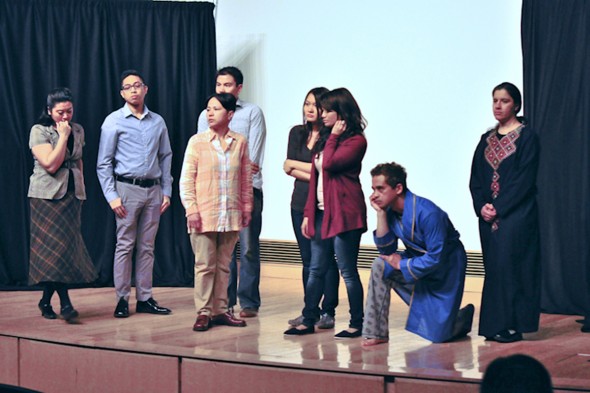Overpowering the silence on cultural stigmas

Actors take the stage for “Silencing Stigma: Speaking Out,” sharing true stories gathered by UIC students. “We really need to engage with the communities that are in our backyards,” says Rooshey Hasnain, clinical assistant professor of Asian American studies. Photo: Maggie Mui
The social, emotional and psychological complexities Asian Americans face played out onstage during “Silencing Stigma: Speaking Out.”
Nine students in the Asian American Studies program course ASAM 490 (Mental Health, Asian Americans and Community Engagement) collaborated with CIRCA Pintig, a nonprofit community arts organization, for the April 4 event at James Stukel Towers Event Center.
Students interviewed seven Asian Americans from campus and the surrounding community and adapted their cultural struggle with mental health issues for the stage. The event was part of Asian American Awareness Month.
“These are true stories collected from storytellers,” said Rooshey Hasnain, clinical assistant professor of Asian American studies and disability and human development.
“Storytelling is where movement building happens, that’s where social change happens, but if you’re silent about an issue you don’t want to talk about, how can we advance anything?
“It’s not only about a performance, but it’s about what do we do with that and how do we take that to the next level of engagement?”
The play opens with Jane, a Taiwanese American reflecting on her struggle to find independence after leaving Calvin, a man she once loved. Searching for answers, she relives her parents’ lack of compassion for her boyfriend, who uses a wheelchair.
Transitioning to the anger-driven monologue of a gay South Indian man, the play tackles the theme of recovering from an abusive relationship while adding a modern problem — being outed on social media by his former partner.
A nursing student from India confesses to having dropped out of school months ago, unbeknownst to her father. An overwhelmed Cambodian chemistry student struggles for approval from his father while hiding his drug addiction.
The final act leaves the audience with a young Iraqi woman recounting the horrors of life after Saddam’s reign and a sense of ignorance toward the plight of civilians caught up in international politics.
Over the past few years, the need to address mental health issues and the stigma attached to them has become more apparent. Programs such as the UIC AANAPISI Initiative, which is fully funded by the U.S. Department of Education’s Asian American and Native American-Pacific Islander-Serving Institutions Program, have created Asian American studies programs — including UIC’s program — that bring together voices on these issues.
“We’re a small program and we’re young,” Hasnain said. “The course was created based on a need that came up from the work we’ve been doing, not only on campus but off campus when it comes to Asian American issues.
“Asian American studies programs are starting to think about how you develop a course with important scholarship and intellectual conversations, but still have an impact that tackles issues of mental health.”
Collaboration on these issues is central, Hasnain said. Bringing together student organizations, community and UIC staff helped to bring this production to life. Future collaborative efforts will propel further discussion of these issues and overpower silence, she said.
“You do need to cross boundaries, not only on campus — but we really need to engage with the communities that are in our backyards,” she said.
